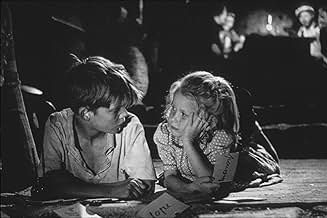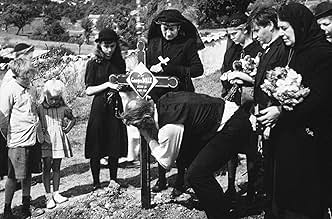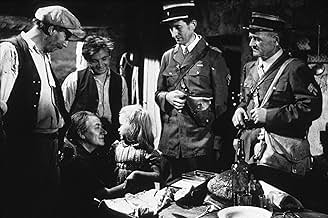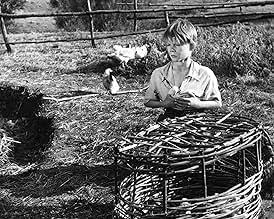CALIFICACIÓN DE IMDb
8.0/10
14 k
TU CALIFICACIÓN
Una joven francesa, huérfana tras un ataque aereo Nazi, se hace amiga del hijo de un granjero pobre, y juntos intentar dar sentido a la realidad de la muerte.Una joven francesa, huérfana tras un ataque aereo Nazi, se hace amiga del hijo de un granjero pobre, y juntos intentar dar sentido a la realidad de la muerte.Una joven francesa, huérfana tras un ataque aereo Nazi, se hace amiga del hijo de un granjero pobre, y juntos intentar dar sentido a la realidad de la muerte.
- Dirección
- Guionistas
- Elenco
- Nominado a 1 premio Óscar
- 8 premios ganados y 2 nominaciones en total
Marcel Mérovée
- Raymond Dollé
- (as Pierre Merovée)
Denise Péronne
- Jeanne Gouard
- (as Denise Perronne)
Marie-Pierre Casey
- Infirmière
- (sin créditos)
André Enard
- Le premier gendarme
- (sin créditos)
Marcelle Feuillade
- La mère de Paulette
- (sin créditos)
Roger Fossey
- Le père de Paulette
- (sin créditos)
Opiniones destacadas
I am incapable of writing reams about films I admire because words do no justice to the magic they conjure.
FORBIDDEN GAMES left me speechless when I first saw it two decades ago.
It is ABOUT two French children, a peasant boy, a Parisian girl, who become close friends as World War 2 ravages Europe.
The film LOOKS at the way warfare effects the innocent and transforms one's view of death.
Director Rene Clement sets the story in a rural village and peoples his story with some of the most authentic characters ever to tred the silver screen. He employs humour, horror and humanism to tell his story and solicits an incredible performance from moppet Brigitte Fossey.
It's a tearjerker, too, it's emotionally delicate, and it's perfectly manipulated drama -- all good drama is.
Its power is its apparent simplicity.
A love letter to cinema that is also one of the greatest and most haunting war movies ever made.
The imagery and the heart-rending music score will remain with you forever.
FORBIDDEN GAMES left me speechless when I first saw it two decades ago.
It is ABOUT two French children, a peasant boy, a Parisian girl, who become close friends as World War 2 ravages Europe.
The film LOOKS at the way warfare effects the innocent and transforms one's view of death.
Director Rene Clement sets the story in a rural village and peoples his story with some of the most authentic characters ever to tred the silver screen. He employs humour, horror and humanism to tell his story and solicits an incredible performance from moppet Brigitte Fossey.
It's a tearjerker, too, it's emotionally delicate, and it's perfectly manipulated drama -- all good drama is.
Its power is its apparent simplicity.
A love letter to cinema that is also one of the greatest and most haunting war movies ever made.
The imagery and the heart-rending music score will remain with you forever.
Wonderfully wry, ribald, and ironic look at children, life, and death in the provinces. This must be one of the best examples of poetic realism much better than any Renoir you'll see it's alive and humane, comprising a hundred little iconic cinema moments and several major ones.
A little girl, whose parents are killed in an air-raid at the beginning, wanders into a nearby farm clutching her dead dog and is taken in. She becomes attached to the boy at the farm and they start to expand her dog's grave into a little cemetery of dead animals. There's nothing macabre or sinister about this, nor (as the blurbs maintain) is it particularly a statement about the effect of war on children - it's simply the sort of thing kids might do. When they start pinching crosses from the real cemetery though, they are in for it.
The peasant family are a hoot. The father has a hilarious running feud with his neighbour; the daughter is having an illicit affair with the neighbour's son; the elder son succumbs to a tragi-comic demise after an innocuous accident; the second is a good-natured hick; and the youngest boy gets clouted by his father at every turn ("Take that!", says the father as he smacks him across the head "...and that!" says his sister as she plonks some flowers into his hand). Their every movement is bursting with rough humour and vitality and we are being shown something interesting in every frame. It comes vividly to life, and as an evocation of childhood is up there with Selznick's Tom Sawyer and "Spirit of the Beehive".
Remarkable performances from the two children. There's no sanctimoniousness or even self-awareness to it; Clement got it down and it came out right.
A little girl, whose parents are killed in an air-raid at the beginning, wanders into a nearby farm clutching her dead dog and is taken in. She becomes attached to the boy at the farm and they start to expand her dog's grave into a little cemetery of dead animals. There's nothing macabre or sinister about this, nor (as the blurbs maintain) is it particularly a statement about the effect of war on children - it's simply the sort of thing kids might do. When they start pinching crosses from the real cemetery though, they are in for it.
The peasant family are a hoot. The father has a hilarious running feud with his neighbour; the daughter is having an illicit affair with the neighbour's son; the elder son succumbs to a tragi-comic demise after an innocuous accident; the second is a good-natured hick; and the youngest boy gets clouted by his father at every turn ("Take that!", says the father as he smacks him across the head "...and that!" says his sister as she plonks some flowers into his hand). Their every movement is bursting with rough humour and vitality and we are being shown something interesting in every frame. It comes vividly to life, and as an evocation of childhood is up there with Selznick's Tom Sawyer and "Spirit of the Beehive".
Remarkable performances from the two children. There's no sanctimoniousness or even self-awareness to it; Clement got it down and it came out right.
This movie is a solid reminder of how a film does not need to be graphically violent, sex- ridden, and controversy-drenched to really affect the viewer. I picked this movie up from my local library and have watched it twice in the last two days. I chose this title simply because it bore the Criterion Collection emblem on the jacket cover and I had heard nothing about the movie at all before that time.
That being said, i knew very little of what to expect nor would i be prepared for the power of this movie.
From the opening scenes, the audience is thrown into a world of chaos and terror. This world is then filtered through the eyes of Paulette, a young french girl, as she struggles to find safety and peace from the destruction and displacement of world war two. She meets a young farm-boy, Michel, with whom she instantly bonds. Michel and Paulette begin to play games (hence the title) and create worlds separate from the noise and confusion of adults. Together they search for peace within their microcosm, and, in their own way, serve as symbols for love and friendship as Michel attempts to constantly make Paulette happy and Paulette, in turn, gives Michel something his large family never has time to award him: love.
Through breathtaking cinematography and flawless acting, Forbidden Games captivates and holds that captivation for its entirety. With strong anti-war messages this film still pertains to the present and will continue to stay relevant so long we as a human race continue to make war. There will always be children that will have to somehow rationalize the seemingly unfathomable actions of adults and there will always be adults who should turn to their children to learn the simple pleasures of life ignored in the bustle of growing old.
That being said, i knew very little of what to expect nor would i be prepared for the power of this movie.
From the opening scenes, the audience is thrown into a world of chaos and terror. This world is then filtered through the eyes of Paulette, a young french girl, as she struggles to find safety and peace from the destruction and displacement of world war two. She meets a young farm-boy, Michel, with whom she instantly bonds. Michel and Paulette begin to play games (hence the title) and create worlds separate from the noise and confusion of adults. Together they search for peace within their microcosm, and, in their own way, serve as symbols for love and friendship as Michel attempts to constantly make Paulette happy and Paulette, in turn, gives Michel something his large family never has time to award him: love.
Through breathtaking cinematography and flawless acting, Forbidden Games captivates and holds that captivation for its entirety. With strong anti-war messages this film still pertains to the present and will continue to stay relevant so long we as a human race continue to make war. There will always be children that will have to somehow rationalize the seemingly unfathomable actions of adults and there will always be adults who should turn to their children to learn the simple pleasures of life ignored in the bustle of growing old.
The first thing to bear in mind is that "Jeux interdits" was first a short ,part of a film made up of sketches -two others were to be made.For financial reasons,they were eventually jettisoned ,and "jeux interdits" had to be fleshed out to the proportions of a feature-length film.So additional scenes were shot more than one year after the first ones...and of course the children had grown up! Clement and his team had to make wonders to hide that.And they outdid themselves so brilliantly that nobody saw their "effects".
Now for the ending:Clement wanted a prologue and an epilogue:Fossey and Poujouly would read a book which told the tale of two children (Paulette and Michel).Those short sequences were eventually withdrawn,which explains this unexpected ending which still baffles the audience today.
As for the movie,needless to say it's one of the most important works of the French cinema.Some users did comment it so well I won't add anything except for Brigitte Fossey's performance,which will remain the most powerful one for such a young child.It was not surprising that Fossey enjoyed a brilliant career when she grew up...even if she never found a part so striking afterward.
Now for the ending:Clement wanted a prologue and an epilogue:Fossey and Poujouly would read a book which told the tale of two children (Paulette and Michel).Those short sequences were eventually withdrawn,which explains this unexpected ending which still baffles the audience today.
As for the movie,needless to say it's one of the most important works of the French cinema.Some users did comment it so well I won't add anything except for Brigitte Fossey's performance,which will remain the most powerful one for such a young child.It was not surprising that Fossey enjoyed a brilliant career when she grew up...even if she never found a part so striking afterward.
Never has the world of adults seemed so utterly stupid, brutal and senseless than through the eyes of two innocent children who have to deal with pain, loss, death and war. And yet, the film is gentle, subtle, inobtrusive in its portrayal of the grown-up's follies, and refreshingly unsentimental about presenting the pain and beauty of childhood.
A masterpiece.
Few other titles come to mind in which child actors have so much to bear, and they manage it effortlessly & unforgettably.
[The only thing that bothers me is the too convincing 'acting' of the dead /?/ dog...]
A masterpiece.
Few other titles come to mind in which child actors have so much to bear, and they manage it effortlessly & unforgettably.
[The only thing that bothers me is the too convincing 'acting' of the dead /?/ dog...]
¿Sabías que…?
- TriviaIn a television interview ("Vivement Dimanche Prochain", France 2, 17 April 2005) Brigitte Fossey, who played the little Paulette, revealed that the film had originally been shot as a short, and then it was later decided to extend it into a feature film. Unfortunately she had lost her milk teeth and Georges Poujouly (who plays the boy Michel) had had his hair cut to play in Todos somos asesinos (1952). So, in many scenes of the movie Paulette has false teeth and Michel is wearing a wig.
- ErroresThe poor parents are killed by a Focke-Wulf 190. This kind of plane didn't exist at the moment of the "battle of France" in May and June 1940.
- Créditos curiososThere are two alternate opening credits:The main credit starts with a story book and a female hand opens the book to reveal the credits. The alternate still has the same book but this time we are introduced to the two main characters who are sitting by a lake. In this version, Michel's hand is turning the page and in between the scenes he tells Paulette that he's going to tell a story.
- ConexionesFeatured in Le ciné-club de Radio-Canada: Film présenté: Jeux interdits (1959)
Selecciones populares
Inicia sesión para calificar y agrega a la lista de videos para obtener recomendaciones personalizadas
- How long is Forbidden Games?Con tecnología de Alexa
Detalles
- Fecha de lanzamiento
- País de origen
- Sitio oficial
- Idioma
- También se conoce como
- Forbidden Games
- Locaciones de filmación
- Productoras
- Ver más créditos de la compañía en IMDbPro
Taquilla
- Total en EE. UU. y Canadá
- USD 33,284
- Fin de semana de estreno en EE. UU. y Canadá
- USD 4,316
- 26 abr 2015
- Total a nivel mundial
- USD 33,897
- Tiempo de ejecución1 hora 26 minutos
- Color
- Relación de aspecto
- 1.37 : 1
Contribuir a esta página
Sugiere una edición o agrega el contenido que falta

Principales brechas de datos
By what name was Juegos prohibidos (1952) officially released in India in English?
Responda














